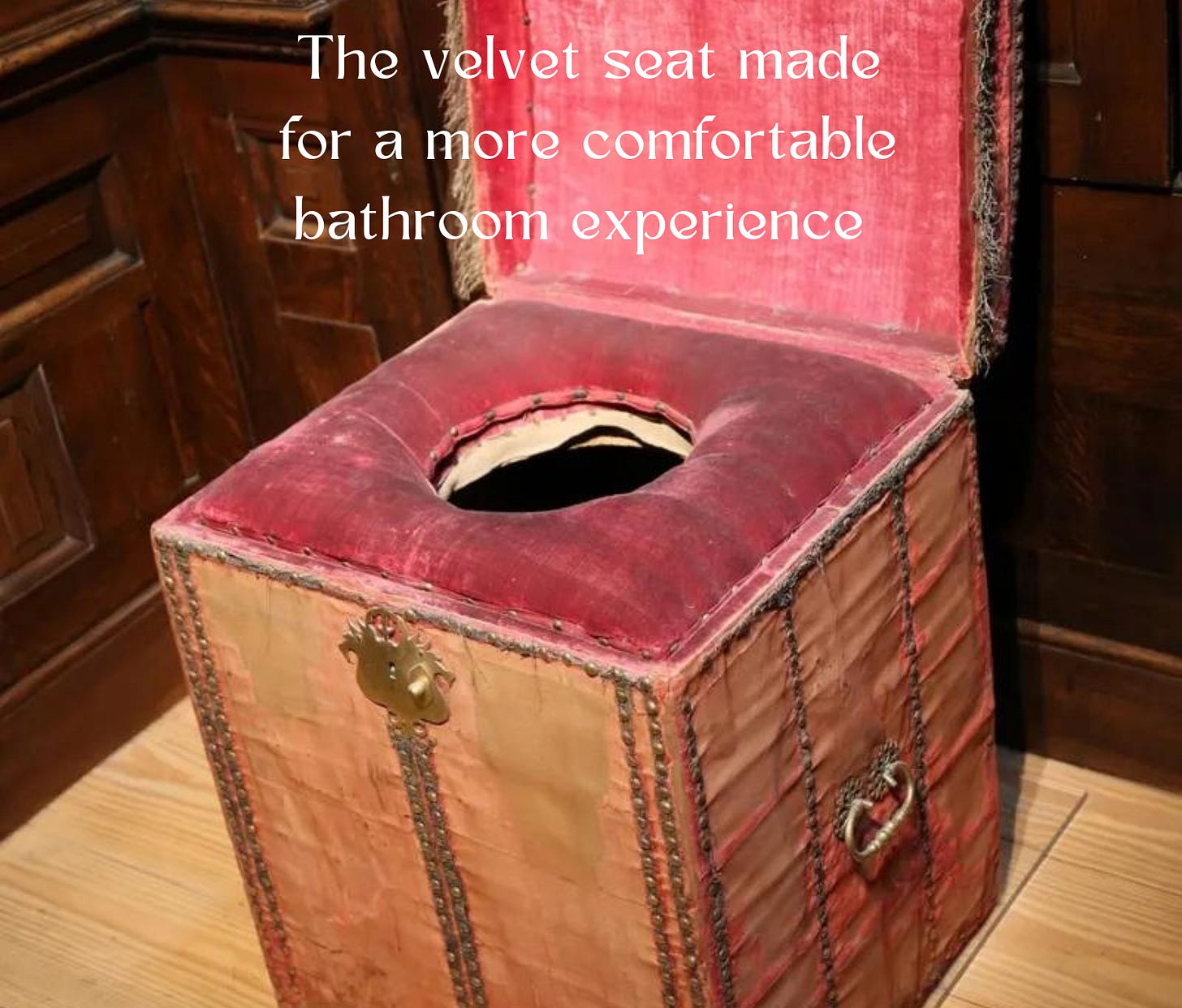Fecal Guardian, Bashful Bowels, and why shared sponges are a super bad idea
Also, why you may want to try the Beet Challenge
F.ascinating facts
The Groom of the Stool - From Fecal Guardian to Trusted Advisor?
I mean, this one surprised me. Even Mike Rowe might’ve raised an eyebrow at this gig.
What is Groom of the Stool?
Going back to the English monarch days, the Groom of the Stool (aka “Groom of the King’s Close Stool”) was basically a male servant of the King, whose duties were, shall we say, quite intimate. At first, I thought this poor guy was only tasked with taking care of the king's personal bathroom needs. However, it turned out to be a much more powerful role. Allow me to elaborate.
First, it would be helpful to define exactly what is “the Stool”. It’s not what you may think. The Stool back in the Tudor days was basically a portable toilet, made in the shape of a cabinet or box at sitting height with an opening at the top. There was a “chamberpot” down below to receive the excrement. Yes, the stool has two meanings - as a type of seat and the other, of course, as human feces. Here we are referring to the type of seat.
The Groom of the Stool (sometimes known as a courtier) was essentially responsible for supplying the King with towels, water, and a washbowl after he was done defecating. Now it is not definitively known whether the Groom of the Stool actually wiped the King’s behind; maybe he did, maybe he didn’t. During that time, dehumanizing situations were not unusual, therefore it's possible that he did.
And for most mundane jobs, the story would end here. But not this one.
Evolution of the World’s “Crappiest” Job 👑
The Groom of the Stool position first appeared under King Henry VII’s rule and was greatly expanded under Henry VIII. The Groom was not only responsible for monitoring the King’s bathroom business but acted as a liaison between the King and his personal doctor to make certain the King was staying in good health.
Interestingly, the job was typically given to sons of noblemen or members of the gentry. The Grooms of the Stool began to serve as personal secretaries to the King, who placed great confidence in the Groom. It wasn’t long before the Groom was feared by others within the royal court due to his special relationship with the King.
The Grooms were well-rewarded with benefits such as accommodations in all the palaces, the Sovereign's clothing, and the option to select any previously utilized bedroom decor. But that’s not all.
For instance, Sir William Compton of Compton in Warwickshire (c1482–1528), was Henry VIII’s first Groom of the Stool. He eventually went on to become exceedingly rich and was even given lucrative offices, including the Chancellor of Ireland. Not bad coming from humble beginnings.
The Groom of the Stool is the epitome of starting from the bottom (pun there) and working your way up. It just goes to show that even the crappiest of jobs can lead to a seat of power.
L.oo’s lavatory lingo
Dunnyman was not the funnyman
In Australia, the word “dunny” essentially means toilet or outhouse. It stems from the British English word “dunnekin” which means "outside house” or “dung house". Interesting that the unlucky person who had the crappy job of emptying the pan beneath the seat in a “dunny” was known as a “dunnyman”.
I’m just wondering what that job interview was like back in the day…
U.seful information
Bashful Bowels: Is Traveler’s Constipation Real?
Why do we find it more difficult to poop when we are away from home? And why does the urge to use the bathroom intensify when you’re close to home? Is there a radar somewhere in the depths of our bowels? An interesting phenomenon explains why our bodies prefer the sanctity of our commodes in our humble abodes.
“Home” Toilet is KING
Our bodies thrive on routine - eating, sleeping, and yes, even the bathroom is no exception. Our bodies get accustomed to daily habits. Familiar surroundings help trigger relaxation and release inhibitions. All of these things affect how quickly food moves through your digestive system.
Our bowels seem to sigh with relief in the cozy confines of our home, knowing it is ‘business’ as usual. Our brains send signals to our bodies that it’s okay to feel at ease. The “home” toilet is KING.
Traveler’s Constipation (Even at the office)
Aww the mind-f*** people go through before deciding to take care of their “urge” while away from home. Take for instance, at the office. Do you go through all of the scenarios in your head as to which coworkers could possibly walk in and “smell” your business? Do you find yourself plotting the best time to slip into the bathroom without anyone noticing? As the famous Stoic philosopher once said “We suffer more often in imagination than in reality”. Except it is actually your bowels that end up suffering.
Using unfamiliar public restrooms, whether it be at an airport, a friend's house, or the office, can create challenges for those attempting to deal with the call of nature. The mind can become preoccupied with concerns such as cleanliness, privacy, or the possibility of someone walking into your unique fragrant cloud. This tension can lead to “traveler's constipation”, which can cause discomfort when attempting to use the restroom. Our internal clocks can become disoriented, leading to changes in our digestive system. Hormones such as cortisol can also kick in, and our eating habits may change, further complicating the issue.
Tale of Two Sphincters
Did you know we have two sphincters? I sure as hell didn’t know this until I looked into it.
There’s no other way to put it, but we basically have two bungholes: the inner sphincter, and the outer sphincter.
The presence of poop controls the inner sphincter. The outer sphincter seems to be more sophisticated as it is controlled by your brain. When your poop arrives at the inner sphincter, it opens up. The only thing preventing you from crapping your pants at this point is your brain telling your outer sphincter “Don’t poop!” The internal and external anal sphincter are muscles that work together to maintain stool continence.
According to an article in Eatingwell.com, a German Doctor and author Giulia Enders states,
“The outer sphincter we can control; the inner one has more of a mind of its own. The inner one will open a little bit to ‘test’ whether what's there is a gas or a solid. There are sensory cells that analyze what has been delivered," Enders explains, "and this is the moment when our brain knows, 'Oh, I have to go to the toilet.'"
Basically, the brain will scan its surroundings and make a determination if it is a good time to release the Kraken or not. If the brain determines this is not a good place to make a release, then the brain and outer sphincter have a pow-wow with the nerve cells to push the poop “back in line to deal with later, say, when we’re in the comfort of our own home bathroom.”
The eccentric yet intricate connection between our minds, bodies, and our environment is quite fascinating. Our bodies have a unique way of letting us know it’s time to go. Embracing this fascinating quirk can be the difference between having a successful public poop no matter where you are, or stopping yourself up for no necessary reason.
S.ay What???
Shared Sponge + Stick = Intestinal Worms?
If you were an A.D. Roman and nature called, you had to travel to a communal latrine (aka public bathroom). This consisted of several holes in a row cut into a slab of marble:
There was ZERO privacy. You are right next to your neighbor, shooting the shit (pun definitely intended), and handling your business. So how did the Romans wipe after they were finished using the bathroom?
It pains me to even write down this thought. The Romans used a sea sponge attached to the end of a stick, called a “Tersorium” to wipe their behinds after pooping. The Tersorium was kept in a bucket of...wait for it..vinegar and salt! That sounds like it would burn like hell! 🔥
Anyway, there was another hole between your legs where you inserted the tersorium and wiped your derriere until it felt “clean”. Now here’s the kicker - common people had to share the tersoriums – one stick-sponge per communal latrine. That is a lot of asses per one sponge on a stick. Although the tersoriums were soaked in vinegar or brine in an attempt to eliminate infection, the prevalence of harmful diseases like intestinal worms and parasites remained a significant concern.

Now, if you were a wealthy Roman, you often used wool instead of a sponge that was soaked in a bucket of rosewater 🌹. I’m sure it still felt like sandpaper on your behind, but at least you had the wiping device to yourself.
H.ealthy Habits
Using Beets as Your Internal Transit Timer
So I was curious about how long it would take for my food to go from ingestion to excretion. I had read about eating beets and how this is a good way to test if your bowels are in working order. You see, after eating beets, you’ll know your “transit” time when you see your poop is RED in the toilet. So I tried it.
Average Transit Time?
But first I wanted to know, what is the ideal digestion time? Several factors affect this outcome - diet, exercise, hormones, sleeping habits, and more. And regarding the actual average transit time, I couldn’t get a straight answer in my research. For instance, the Mayo Clinic states it can take 2 to 5 days to fully digest food. Really? That seemed like a long time to me. WebMD states anywhere from 10 to 59 hours. And another website even suggested 12 to 24 hours (this sounded more reasonable).
I also read that if your digestion seemed to be short in duration (less than 12 hours), it could mean you are having malabsorption of food. That’s not good because you need nutrients to keep your body running properly. If your digestion seems to take a prolonged time (for instance over 36 hours), then it may mean food is sitting in your bowels for too long. This could translate to a toxic bowel which can lead to bowel diseases like cancer, irritable bowel syndrome, and more.
If you feel your digestion time is too short or too long, you may want to look into making a few adjustments that suit you and your body. Adjustments like intermittent fasting, dietary changes, moving more, reducing stress, and/or drinking more water. It’s always helpful to see your health professional if you have concerns.
Trying the Beets Challenge
So I steamed up about a cup of beets and I entered my bowels into a one-person beets transit challenge. I ate. Then I waited, hours and hours and hours. Finally after 22 hours voila! I honestly thought my transit time would be shorter. But as I previously mentioned above, there are many factors that affect your bowel’s performance.
Using beets as your internal journey or transit timer is a great way to test your bowels if you feel your digestion and bowel movements are off. If you're experiencing the need to use the restroom too soon after a meal or feel your bowel movements are taking too long to happen, consider preparing a cup of beets and taking this challenge. You might be surprised!













